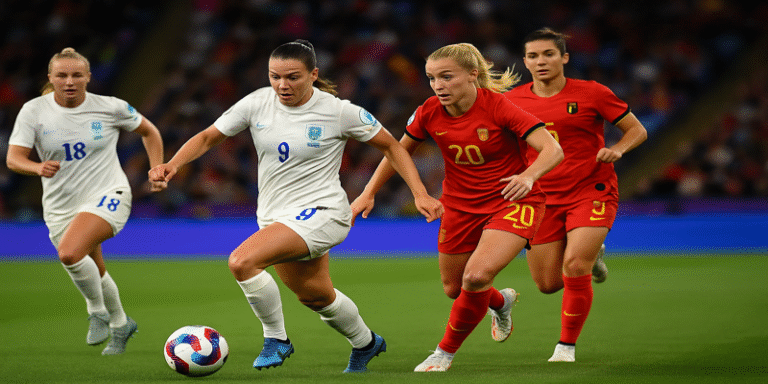The UEFA Women’s EURO 2025, scheduled to be hosted in Switzerland, is shaping up to be a landmark event not only for women’s football but for gender equality in sport more broadly. Following the record-breaking UEFA Women’s EURO 2022 in England, where over 570,000 spectators attended the matches and millions watched globally, the 2025 tournament promises to build on this momentum, amplifying the visibility, commercial appeal, and societal value of women’s football across Europe and beyond (UEFA, 2022).
England Crowned Champions in Historic Final
England are the champions of Europe, defeating reigning world champions Spain in a dramatic UEFA Women’s EURO 2025 final. The showdown, held on Sunday 27 July at St. Jakob-Park in Basel, concluded a month of elite football with a fittingly intense climax.
After a tightly contested 1–1 draw in regular and extra time, the match was decided by a penalty shootout. Spain struck first through Aitana Bonmatí in the 39th minute, but England equalised just after the hour mark thanks to a composed finish from Lauren James. Both sides had chances to win it in open play, but the deadlock persisted through 120 minutes of relentless competition.
In the shootout, goalkeeper Mary Earps delivered a masterclass in composure and anticipation, saving two penalties to give England the edge. Chloe Kelly stepped up to convert the decisive spot-kick, securing a 3–1 shootout victory and England’s second UEFA Women’s EURO title.
The win marks a historic moment for English football, as the Lionesses overcame the current world champions in a final that showcased tactical depth, technical excellence, and emotional resilience. It also serves as a symbolic victory for the continued rise of women’s sport in Europe and around the world.
The Growth of the Women’s Game
Over the past decade, women’s football has undergone a profound transformation. Tournaments have witnessed increased audience engagement, media coverage, and sponsorship investments, indicating a shift in both perception and potential. The Women’s EURO has been pivotal in this evolution, serving as a stage for elite competition and a barometer of the sport’s development.
According to Culvin and Bowes (2023), the globalisation of women’s football has entered a “professional era,” marked by structured leagues, elite academies, and international marketing. The 2025 edition reflects UEFA’s commitment to institutionalising this growth through strategic investment in hosting infrastructure, grassroots support, and commercial outreach.
Gender Equality and Institutional Action
UEFA has explicitly framed the Women’s EURO 2025 as part of a broader mission to close the gender gap in football. This includes equalising prize money, increasing support for national federations, and ensuring parity in coaching, refereeing, and administrative opportunities (Carrick, 2025). The UEFA Women’s Football Strategy: Time for Action (2019–2024) outlined goals such as doubling female participation and increasing visibility—goals which the 2025 tournament is expected to advance significantly.
Yiapanas (2025) highlights how events like EURO 2025 act as “catalysts for gender equity,” challenging long-standing stereotypes and encouraging institutions to support female athletes with equal vigour. Yet challenges remain. Pay gaps, media framing, and limited access to elite pathways continue to constrain many female footballers, even in top-tier federations (Antunovic & Cooky, 2025).
Legacy and Grassroots Development
A defining feature of EURO 2025 will be its legacy ambitions. UEFA and the Swiss Football Association (SFA) have partnered with schools, youth programmes, and local clubs to ensure that the benefits of hosting are not ephemeral. The emphasis is on sustainable development—investing in facilities, training coaches, and launching girl-specific recruitment schemes (Galdino, 2025).
The grassroots impact is particularly significant in traditionally underrepresented regions. In Eastern and Central Europe, for example, the sport has lagged due to historical and political barriers. However, as Wojtaszyn et al. (2024) argue, the EURO can act as a unifying platform to elevate the status of women’s football in these regions through exposure and targeted funding.
Visibility and Media Representation
One of the most transformative aspects of the Women’s EURO is its impact on media narratives. The 2022 edition received unprecedented coverage from outlets like BBC, Sky, and Eurosport, shifting portrayals from novelty to legitimacy. Studies such as Carrick (2024) reveal that such representation has a direct effect on young girls’ aspirations and society’s acceptance of women’s sport as professional and high-stakes.
Nonetheless, biases persist. Women’s matches are still often framed in terms of appearance, emotion, or novelty rather than tactics and athleticism. The upcoming tournament will be a litmus test for whether media institutions can progress beyond tokenism and deliver gender-equitable coverage.
Hosting and Infrastructure Readiness
Switzerland was selected as the host for UEFA Women’s EURO 2025 from among four bids. The country offers a mix of modern stadiums, transport infrastructure, and commitment to gender equity, making it an ideal environment for staging the event. The matches will be held across eight host cities, including Basel, Geneva, and Zurich (UEFA, 2023).
Preparations have focused not only on logistical execution but on community engagement. Cities have launched volunteer programmes, educational workshops, and inclusive fan zones to promote diversity. As Salmijärvi (2025) notes, inclusive planning ensures that the tournament doesn’t just entertain, but transforms.
Financial Sustainability and Investment
Investment in women’s football is no longer just a social issue—it’s becoming an economic imperative. Recent financial analyses suggest that women’s football offers untapped market value, with increasing sponsorship revenue, merchandising, and broadcast rights (Scelles et al., 2022). UEFA aims to leverage EURO 2025 to attract long-term sponsors committed to the women’s game, thereby reducing reliance on male-associated revenues.
Yet economic challenges remain, particularly around wage disparity, club solvency, and professionalisation across all member nations. As Lapré and Amato (2025) argue, financial modelling and equitable distribution mechanisms are essential for sustaining competitive balance across Europe.
Coaching, Leadership and Pathways
The development of women’s football also depends on leadership diversity. Coaching, officiating, and administrative roles remain predominantly male-dominated. The FEMCoach project and UEFA’s Coach Education Framework are attempting to bridge this gap by offering subsidised licences, mentoring programmes, and female-only development tracks (Dias et al., 2025).
Galdino (2025) identifies EURO 2025 as an inflection point for expanding female representation in coaching, particularly at elite levels. Research shows that representation not only fosters inclusion but can improve player development through culturally informed leadership.
Symbolism and Social Change
Beyond statistics, EURO 2025 carries symbolic weight. It signals a commitment by UEFA and the wider footballing community to inclusion, equity, and social transformation. For many girls and women across Europe, it represents a breaking of ceilings—a chance to be seen, celebrated, and respected on par with their male counterparts.
Rogstad et al. (2024) highlight how athletes like Ada Hegerberg and Vivianne Miedema have used their platforms to advocate for equal pay and visibility, and EURO 2025 offers an opportunity to extend this advocacy into structural reform.
The UEFA Women’s EURO 2025 is far more than a sporting tournament. It is a platform for advocacy, a stimulus for reform, and a beacon of progress in the world of sport. From coaching pathways and financial investment to media narratives and grassroots access, the event encapsulates the multifaceted journey of women’s football from marginality to mainstream.
If executed with foresight and equity, EURO 2025 could mark a definitive turning point—one that redefines not only how the world views women’s football, but how society understands fairness, excellence, and opportunity in sport.
References
Carrick, S. (2025). An Analysis of the Equal Pay Debates in Women’s Football. In Routledge Handbook on Sports Law and Governance. https://taylorfrancis.com
Culvin, A. & Bowes, A. (2023). Women’s Football in a Global, Professional Era. Emerald Publishing.
Dias, V.O., Calleja-González, J. & Arede, J. (2025). Addressing Gender Disparities in Youth Sport Coaching. International Journal of Sports Science. https://journals.sagepub.com/doi/abs/10.1177/17479541251347932
Galdino, M. (2025). Forward Thinking: The Potential and Career Development of Female Coaches in Europe. UEFA Academy. https://uefaacademy.com
Lapré, M.A. & Amato, J.G. (2025). The Impact of Imbalanced Groups in UEFA Euro 1980–2024. Journal of Quantitative Analysis in Sports. https://www.degruyterbrill.com/document/doi/10.1515/jqas-2024-0151
Rogstad, E.T., Tjønndal, A. & Røsten, S. (2024). From Field to Feed: Norwegian Football Players on Instagram. International Review for the Sociology of Sport. https://journals.sagepub.com/doi/abs/10.1177/10126902241252319
Salmijärvi, O. (2025). Stakeholder Perspective on Challenges in Women’s Football. University of Jyväskylä. https://jyx.jyu.fi
Scelles, N., Valenti, M., & François, A. (2022). Gender Inequality in European Football. Economies, 10(12), 315. https://www.mdpi.com/2227-7099/10/12/315
UEFA (2022). Women’s EURO 2022: Final Report. https://uefa.com









